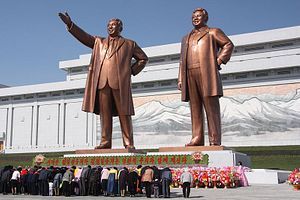Scheduled talks between North Korean government representatives and former U.S. officials to be held in New York have been called off after the United States chose to deny a visa to Choe Son-hui, the North Korean Foreign Ministry’s director-general on North American affairs. The unofficial talks would have taken place near the United Nations headquarters in New York City on the “first two days of March,” the Wall Street Journal notes.
The short-lived proposal — seemingly a way for the regime in Pyongyang to feel out a possibility for a diplomatic opening with the United States in the early days of the Trump administration — would have been the first such publicly reported talks in almost six years. According to the Washington Post, it is possible the final straw that led to the cancellation of the talks was North Korea’s use of a highly lethal chemical weapon, the VX nerve agent, to kill Kim Jong-nam, Kim Jong-un’s half-brother.
Beyond its use of a weapon of mass destruction in a crowded international airport, North Korea has also tested the United States’ patience with its February 12 launch of the Pukkuksong-2 solid-fuel, medium-range ballistic missile. The launch came during U.S. President Donald J. Trump’s meeting with Japanese Prime Minister Shinzo Abe. The Trump administration has been conducting a review of U.S. policy toward North Korea since the start of February, when U.S. Secretary of Defense Jim Mattis visited both Seoul and Tokyo.
The now-cancelled talks could have been an opportunity for former U.S. officials to feel out the conditions under which North Korea could be compelled to entertain direct talks on its nuclear weapons program with the Trump administration. The list of U.S. representatives involved names that have long been involved with North Korea policy. According to the Wall Street Journal:
The U.S. was to have been represented by Robert Gallucci, the chief U.S. negotiator during the North Korean nuclear crisis of 1994, and Victor Cha, who served in the George W. Bush White House as the National Security Council’s director for Asian affairs. The meeting was arranged by Donald Zagoria, a vice president of the National Committee on American Foreign Policy, who has been involved in previous back-channel dialogues with North Korea, according to the people familiar with the matter.
The cancellation of the New York Track 1.5 talks doesn’t mean that broader engagement at the Track 1.5-level cannot proceed. Former U.S. officials and academics have met North Korean representatives outside the United States in recent years. The most recent meeting between Choe and former U.S. officials took place in Geneva in November, days after the U.S. election.
Trump, meanwhile, told Reuters last week that he would not rule out completely the possibility of meeting North Korea leader Kim Jong-un, but that prospect of such a meeting remains distant. Kim Jong-un has not met any foreign head of government or state face-to-face since coming to power in 2011.

































